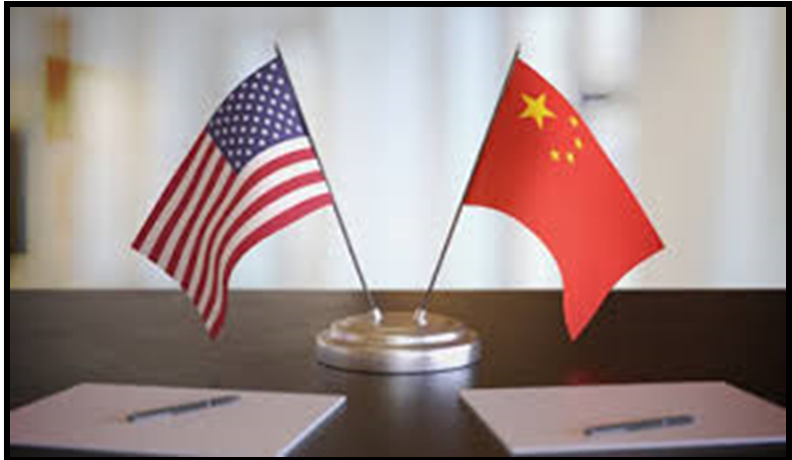GEOPOLITICAL TENSIONS AND ECONOMIC DECOUPLING
Syllabus:
- GS-3- Trade conflicts, impact on International Relations and global economy
Focus :
- The article explores the implications of the recent U.S. decision to impose additional tariffs on Chinese imports, highlighting the potential for increased economic decoupling between the West and China. It examines the broader impacts on global trade, manufacturing, healthcare, and renewable energy, while considering the long-term economic and geopolitical consequences
Source - TET
Introduction
- S. Imposes New Tariffs: In May, President Joe Biden announced new tariffs on Chinese imports, sparking fears of further economic decoupling.
- Europe’s Stance: European policymakers are considering a united front against China’s economic practices.
- Focus on National Security: The West’s trade risk calculations with China are increasingly driven by national security concerns.
Background and Context
- Decoupling Fears: The move signals a potential new phase of decoupling in the global economy.
- Political Rhetoric: Washington’s stance reflects the belief that economic interdependence does not benefit China and the U.S. equally.
- Economic vs. Political Considerations: Political factors, rather than economic ones, are increasingly influencing tariff decisions.
Specific Tariff Examples
- Electric Vehicles (EVs): The U.S. imposed new tariffs on Chinese EVs, despite importing few from China.
- Pro-Union Stance: The decision supports domestic EV manufacturing and the United Auto Workers (UAW) union.
- Medical Devices: New tariffs aim to reduce U.S. dependency on Chinese medical equipment, valued at $640 million in 2023.
About WTO :
|
Economic Implications
- Healthcare Costs: The tariffs on medical devices could increase healthcare costs in both countries.
- Consumer Impact: Protectionist measures lead to higher prices for consumers.
Long-Term Effects
- Trump-Era Continuity: The continuation of Trump-era tariffs exacerbates protectionism and geopolitical tensions.
- Global Economic Impact: Tit-for-tat tariffs encourage other countries to adopt similar measures, harming global trade.
- Green Transition Delays: Restrictions on Chinese clean energy products could hinder global renewable energy goals.
Impact on China and Western Multinationals
- Slowing Growth in China: China’s slowing economy and rising household debts affect Western multinationals reliant on its market.
- Export Challenges: Resource-rich countries like Australia and Brazil face challenges in diversifying exports away from China.
European Union and Raw Minerals
- De-risking Trade: The EU’s strategy to reduce dependency on Chinese raw minerals could provoke tighter Chinese control over supply chains.
- Mineral Supply Chain: Potential formation of a mineral-rich grouping led by China to dominate green trade.
Southeast Asia’s Position
- Investment Shifts: Southeast Asia benefits from production and investment moving from China but remains dependent on Chinese technology and investment.
- Rules of Origin: Stricter U.S. rules of origin could limit Southeast Asia’s ability to replace China as a major supplier.
India’s Potential Benefits and Challenges
- India’s Prospects: India is expected to benefit from decoupling but faces competition and economic entanglements with China.
- Manufacturing Phase: India’s manufacturing sector is still developing, affecting its ability to capitalize on global market shifts.
Potential Criis and Future Outlook
- No End in Sight: The cycle of escalation between the U.S. and China shows no sign of ending.
- Psychological Effects: Global investors are likely to feel the psychological impact of decoupling more than its actual significance.
- WTO Paralysis: The U.S. distancing from WTO rules and blocking judge appointments paralyzes the organization’s adjudicatory process.
- Geopolitical Rivalry: The rivalry between the U.S. and China, along with global economic fragmentation, threatens the liberal international order.
Conclusion
- High Stakes: The ongoing trade conflict and decoupling pose significant risks to global economic stability.
- No Clear Winners: The intensifying geopolitical tensions benefit neither the U.S., China, nor the rest of the world.
Source:The Hindu
Associated Article :
https://universalinstitutions.com/towards-stabilization-of-the-u-s-china-ties/
Mains Practice Question :
GS-3
“Analyze the implications of the recent U.S. tariffs on Chinese imports on global economic decoupling. Discuss the potential long-term effects on various sectors, including manufacturing, healthcare, and renewable energy. How might this shift impact the geopolitical landscape and global trade dynamics?”(250 words)




